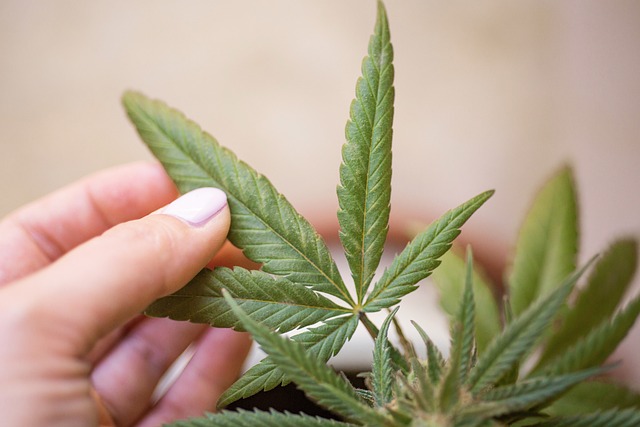In Nebraska, THCA (Tetrahydrocannabinolic Acid), a non-psychoactive cannabinoid found in hemp and cannabis plants, is legally recognized with specific guidelines. Despite the state's conservative stance on cannabis, Nebraskans can legally possess hemp-derived compounds like CBD and THCA as long as their Delta-9 THC content is below 0.3% on a dry weight basis. This has led to a specialized market for THCA, which is touted for its potential therapeutic benefits without psychoactive effects. Legal access to THCA in Nebraska is primarily through medical marijuana programs for patients with qualifying conditions, procured from licensed dispensaries within the framework of state regulations. While THCA is classified as a Schedule I controlled substance under federal law, it is legally accessible in Nebraska for medical use under strict controls and adherence to the Nebraska Department of Agriculture's hemp regulations and the Nebraska Medical Cannabis Act. Ongoing research into THCA's therapeutic properties, such as its anti-inflammatory, antiemetic, and neuroprotective effects, may further influence its legal status within the state. Consumers looking to legally use THCA in Nebraska should stay informed on both state and federal regulations, with an understanding of different consumption methods like smoking, vaping, and edibles, each with its own implications for safety and efficacy.
Delta-9 tetrahydrocannabinolic acid (THCA) has emerged as a subject of intrigue and study within the cannabis community, particularly in states where its legal status is defined. In Nebraska, the conversation around THCA’s legality and accessibility is gaining momentum. This article delves into the complexities surrounding THCA flower’s legal standing in Nebraska, the scientifically backed potential benefits it offers, and how consumers can source high-quality THCA flower while adhering to state laws. We will explore the various methods of consumption, including smoking, vaping, and edibles, and navigate the regulatory framework that governs THCA within the state. Join us as we shed light on this burgeoning area of cannabis research and commerce in Nebraska.
- Exploring THCA Flower's Legal Status and Availability in Nebraska
- The Science Behind THCA: Potential Benefits and Effects
- Sourcing High-Quality THCA Flower in Compliance with Nebraska Laws
- Methods of Consumption: Smoking, Vaping, and Edibles
- Regulatory Framework: Navigating Nebraska's THCA Legislation and Compliance
Exploring THCA Flower's Legal Status and Availability in Nebraska
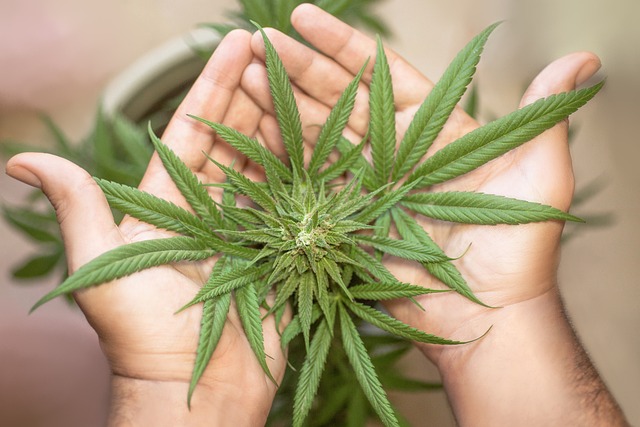
In recent years, the legal status of cannabinoids, including Tetrahydrocannabinolic Acid (THCA), has seen a shift in many regions across the United States. As of the latest updates, THCA, which is the raw, non-psychoactive precursor to Delta-9 THC found in hemp and cannabis plants, has been subject to varying regulations. In Nebraska, the legal landscape for THCA flower is distinct from states that have fully legalized cannabis or its derivatives. While Nebraska’s laws are stringent and restrictive concerning cannabis products, there is a specific provision allowing for the possession of hemp-derived compounds, including CBD and THCA, provided they contain less than 0.3% Delta-9 THC on a dry weight basis. This legal distinction has opened a niche market for consumers interested in exploring the potential wellness benefits associated with THCA flower, which many report to be a non-intoxicating, therapeutic alternative to its psychoactive counterpart.
Navigating the availability of THCA flower in Nebraska requires careful attention to both state and federal laws, as well as compliance with local regulations. While it is legal to possess and consume hemp-derived products, including THCA flower, within the state’s boundaries, consumers must ensure that their sources are reputable and adhering to the legal guidelines. Retailers selling THCA flower must comply with Nebraska’s Department of Agriculture regulations on hemp cultivation, processing, and sales. As a result, while accessibility may be more limited compared to other states with more lenient cannabis laws, interested consumers in Nebraska can still find and legally purchase THCA flower from certain vendors who operate within the confines of state and federal legislation.
The Science Behind THCA: Potential Benefits and Effects
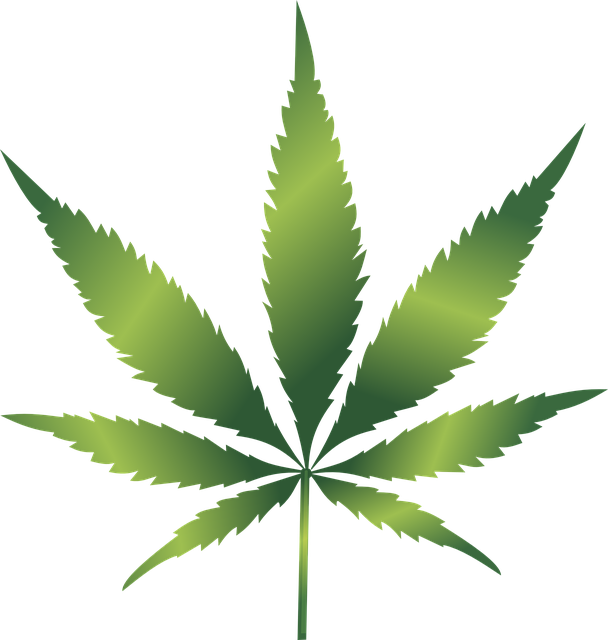
Delta-9 tetrahydrocannabinolic acid (THCA) is a cannabinoid found in the Cannabis sativa plant that is non-psychoactive and exists in high levels in raw cannabis. Despite THCA’s legal status in Nebraska, where it is permissible under certain conditions, its potential benefits and effects have garnered significant scientific interest. Research suggests that THCA may offer a range of therapeutic properties without the psychoactive effects associated with its decarboxylated form, delta-9-THC. Preclinical studies indicate that THCA could exhibit anti-inflammatory, antiemetic (nausea reduction), and neuroprotective qualities, potentially beneficial for conditions like inflammatory bowel disease, nausea and vomiting from chemotherapy, and neurological disorders such as multiple sclerosis. The science behind THCA is still evolving, with ongoing research aimed at elucidating its mechanisms of action and identifying any potential medical applications. As regulations continue to change and more studies are conducted, the understanding of THCA’s effects and its legal status in various states, including Nebraska, may evolve as well.
Sourcing High-Quality THCA Flower in Compliance with Nebraska Laws
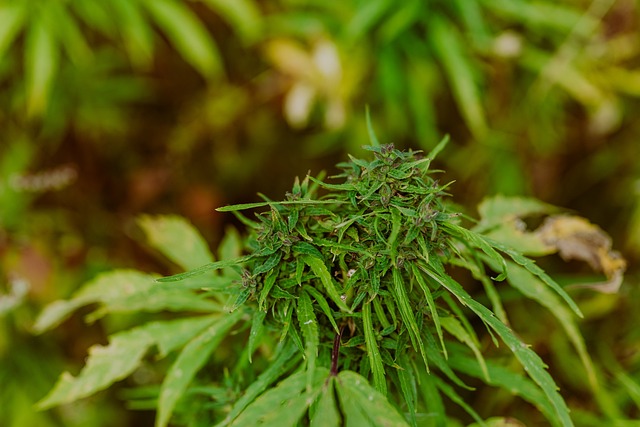
sourcing high-quality THCA flower adheres to stringent regulations set forth by Nebraska’s legislature, where the possession and sale of cannabis products are restricted. However, with the evolving legal landscape, it is possible to find THCA flower that is compliant within the state. Patients with qualifying conditions in Nebraska may access medical marijuana through state-licensed dispensaries, which provide a legal avenue for obtaining THCA flower rich in therapeutic potential. To ensure compliance, consumers must purchase from these regulated entities and adhere to possession limits as defined by Nebraska’s laws. The state’s medical marijuana program is carefully structured to prioritize patient well-being while maintaining a clear distinction between THC-containing products and those that contain only THCA, which remains a legal gray area outside of the medical marijuana framework. Therefore, individuals interested in exploring the benefits of THCA flower must navigate the state’s medical cannabis program and its associated regulations to source their needs legally and responsibly. It is imperative to stay informed about the latest legislative updates, as Nebraska’s policies regarding cannabis are subject to change with ongoing discussions around legalization and decriminalization.
Methods of Consumption: Smoking, Vaping, and Edibles
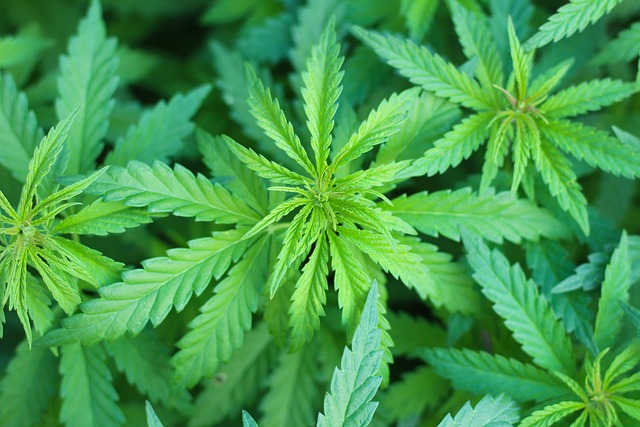
THCA, or Tetrahydrocannabinolic Acid, is a cannabinoid found in the Cannabis sativa plant that has garnered attention for its potential therapeutic properties. As of the knowledge cutoff in 2023, THCA is legal in Nebraska under certain conditions, primarily for medical purposes with a prescription. One of the most common methods of consuming THCA-rich cannabis is through smoking, where the flower is combusted and inhaled, delivering its effects almost immediately. This method is favored by many for its rapid onset, allowing for quick relief from various symptoms. However, it’s worth noting that smoking can have respiratory implications, making it less suitable for individuals with certain health conditions.
Vaping THCA offers a safer alternative to smoking, avoiding the combustion process and thus minimizing potential lung irritation. Vaporizers heat the cannabis flower to a point where the active compounds are released in their respective vapors. This method allows for precision dosing and can be more discreet than smoking. Additionally, vaping can preserve a higher percentage of THCA compared to smoking, as it degrades at high temperatures. Edibles, another popular consumption method, transform THCA into a digestible form by infusing it into food products. The effects of edibles can take longer to manifest—typically 30 minutes to 2 hours—as they must pass through the digestive system before reaching the bloodstream. Edibles offer long-lasting effects and are often preferred for their convenience and the ability to maintain dosage consistency. For those in Nebraska utilizing THCA for medical reasons, understanding these various consumption methods is crucial for optimizing both efficacy and safety. Whether through smoking, vaping, or edibles, each method offers a unique experience that can be tailored to individual preferences and needs.
Regulatory Framework: Navigating Nebraska's THCA Legislation and Compliance

THCA, or Tetrahydrocannabinolic Acid, is a cannabinoid found naturally in the cannabis plant that has garnered attention for its potential wellness benefits. In Nebraska, the regulatory landscape surrounding THCA is shaped by state legislation that both restricts and defines permissible use. Understanding the legal framework is crucial for anyone interested in engaging with THCA flowers within the state’s boundaries.
As of the latest updates, Nebraska’s Uniform Controlled Substances Act categorizes THC, including THCA, as a Schedule I controlled substance. This classification means that THCA is legally prohibited for recreational use. However, there are exceptions for the use and cultivation of cannabis for medical purposes under certain conditions. The Nebraska Medical Cannabis Act allows qualified patients with debilitating medical conditions to access cannabis products that have been approved by the state’s Department of Health and Human Services. Compliance with this act involves a rigorous application process, adherence to cultivation, processing, and dispensing regulations, and maintaining strict inventory controls. It is within this narrow scope that THCA flowers can be legally utilized for medicinal purposes in Nebraska, provided all state and federal regulations are meticulously followed.
THCA flower, a non-psychoactive cannabinoid found in the Cannabis sativa plant, has garnered significant attention for its potential therapeutic properties and legal status. Nebraska’s approach to regulating THCA aligns with a growing national trend towards more nuanced cannabis policies. This article has delved into the intricacies of THCA’s legality within Nebraska, its scientific profile, and the best practices for sourcing quality products. Consumers interested in THCA flower can explore various consumption methods, each offering unique experiences. As the regulatory framework continues to evolve, staying informed on compliance becomes increasingly crucial. For those intrigued by the potential benefits of THCA, it’s clear that understanding its legal standing and responsible use is paramount.
